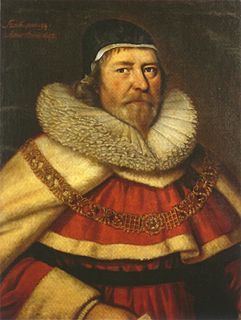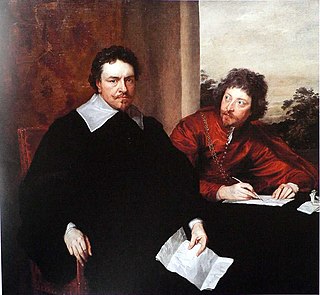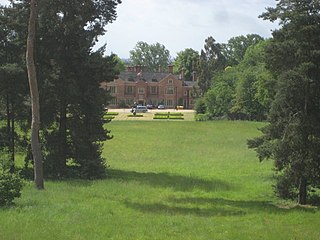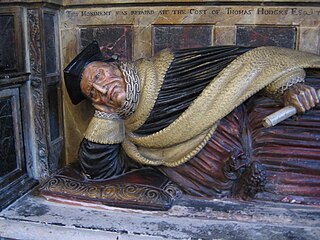Related Research Articles

William Cecil, 2nd Earl of Exeter,, known as the third Lord Burghley from 1605 to 1623, was an English nobleman, politician, and peer.

Sir John Bankes was an English lawyer and politician who sat in the House of Commons between 1624 and 1629. He was Attorney General and Chief Justice to Charles I during the English Civil War. Corfe Castle, his family seat was destroyed during a long siege, in which his wife Mary Hawtrey became known as Brave Dame Mary.
Sir William Stanford, also written Stamford or Staunford, was an English politician, judge and jurist.
Anthony Irby was an English lawyer and politician who sat in the House of Commons at various times between 1589 and 1622.
Henry Compton, 1st Baron Compton, was an English peer and Member of Parliament.
William Honnyng (1520–1569) was an English Member of Parliament and Tudor Court official who served as Clerk of the Signet and Clerk of the Privy Council under Henry VIII and Edward VI.
Sir William Cooke of Highnam Court in Gloucestershire, was an English landowner and politician who sat in the House of Commons at various times between 1597 and 1614.
Sir Miles Fleetwood of Aldwinkle, Northamptonshire was an English office-holder and politician who sat in the House of Commons at various times between 1614 and 1641.
William Fleetwood was an English lawyer and politician. He was Member of Parliament for Marlborough in 1558, Lancaster in 1559 and 1567, and for the City of London several times between 1572 and 1592, but his most significant position was as Recorder of London from 1571 to 1591. A lawyer of the Middle Temple, he was a Queen's Serjeant in 1592.
The Fust Baronetcy, of Hill in the County of Gloucester, was a title in the Baronetage of England. It was created on 21 August 1662 for Edward Fust, who had earlier fought as a Royalist in the Civil War. The title became extinct on the death of the sixth Baronet in 1779.

Sir Philip Mainwaring was an English politician who sat in the House of Commons variously between 1625 and 1661.
Sir Robert Cooke was an English politician who sat in the House of Commons between 1640 and 1643. He served in the Parliamentarian army in the English Civil War.
Francis Goodricke was an English lawyer and politician who sat in the House of Commons at various times between 1659 and 1673.

Sir George Fleetwood was an English politician who sat in the House of Commons at various times between 1586 and 1611.
Anthony Dyott was an English lawyer and politician who sat in the House of Commons between 1601 and 1614.

Sir Richard Verney of Compton Verney in Warwickshire, England, was a landowner and politician who sat in the House of Commons at various times between 1589 and 1614.

Sir George Snigge was an English lawyer and politician who sat in the House of Commons at various times between 1589 and 1605.

Roger Downes was an English lawyer and politician who sat in the House of Commons in 1601 and from 1621 to 1622.
Henry Fleetwood may refer to:
Anthony Wingfield (1550?–1615?), one of a number of figures from the same family of his period, was an English scholar and Member of Parliament, known as reader in Greek to Queen Elizabeth I.